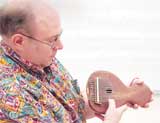World Music joins schedule

Dr. Jeffrey Macomber demonstrates mbiroa, an African thumb piano used in the upcoming class.
World music is a new class for the spring 2005 core curriculum.
The class, unlike music appreciation, looks at music from genres such as Western African drum music to Russian folk music.
“Spring semester 2005 is the first time this class will be offered,” said Dr. Phillip Wise, music department head. “It is in the core curriculum in the course catalog under areas 2A and 2C.”
The class will have music study that will correspond with the international mission of the current semester.
World Music covers music genres ranging from Native American music and Latin American music from South American music to Carribean music.
It will also cover music from such countries as Korea, Japan and China.
Wise said the class offers a global view of music.
He said the class will not focus on only music but culture as well.
“We ordered and received some musical instruments from these different countries,” Wise said. “Students can see and play on African drums and bamboo flutes; instruments not used in band.”
He said the class was welcome in the department.
“The music department is pleased to offer a class that fits so well into the philosophy of the University,” he said.
The course will be offered alongside the music appreciation class.
“World Music is a new addition to the core curriculum at Southern,” said Dr. Jeffrey Macomber, assistant professor of music. “It is a course that is similar to music appreciation in the core curriculum.”
It differs from music appreciation in that the subject of the world music course is non-Western music.
Music appreciation deals mainly with classical music.
“We also intend to begin each semester with a study of indigenous music of the country that is the focus of the international semester,” Macomber said. “For example, next semester, we’ll begin with a study of rural Russian folk music and will follow that with study units devoted to Native American music, Western African music and classical music from India, Indonesia and Peking Opera.”
From semester to semester, the study units will differ.
“If music appreciation can be considered a study of Western classical music from a historical perspective, then world music is more of a study of ethnomusicology,” Macomber said.
Music 106 will meet at 9am Monday, Wednesday and Fridays and is worth three academic credits.
Macomber and Wise said that the course is a great addition to the core curriculum.
“We are delighted in the music department to offer this class,” Macomber said.
Your donation will support the student journalists of Missouri Southern State University. Your contribution will allow us to purchase equipment and cover our annual website hosting costs.



























